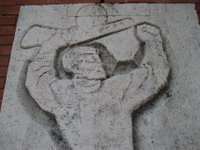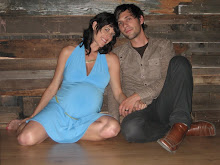
In Slovakia's High Tatras, the trails are meticulously built with jigsaw rocks. This jagged surface begs you on and up into craggy cliffwalks. If you spit over the edge, you'll hit clouds. As far as we can tell, the Slovak people hike these trails until the day they die. The average age of hiker we saw was probably 55 or 60. We even passed a cheery white-haired retiree with climbing rope strapped to her pack. Sometimes, a group would pass by singing songs in Slovak. They’d be pitch perfect and I'd be out of breath. They’d sing to soothe my screaming calf muscles.
We spent a night in a hut on top of the mountain. Pilsner on tap-no joke. Some poor guy has to haul the keg up on his back. Beer is important here in Slovakia. And wine. And dancing, singing, spinning your wife around until she crashes into a table. Slovaks get wild in that old, old school way. (Like before they even had schools.) Out of control traditional dance in a late night restaurant looks something like a mosh pit without the teen angst. Two other things about Slovakia:
1. Garlic Soup
2. Huge trout grilled and spiced and slapped on your plate whole.
Can't explain further or the drool will destroy my keyboard.
We board a train towards Nizne Ruzbachy, where my great-grandparents are from. Two stops later, a group of Roma board(gypsies). The Roma people are a disenfranchised part of the Slovak population who do much of the manual labor and live in squalor. When they board the train, the stench of old body odor and vodka fills the car. Young kids who should be in school are swigging vodka handed to them by toothless fathers. Gambling ensues.
Young Roma kids have this eerie begging style where they chant in a soft, monotone voice while holding a crooked hand out for change. They follow you for way too long and stick way too close- always with the same unnerving chant. It's kind of like having a temporary poltergeist in your backpack which will fish through your pockets if you're not careful.
The Roma are dark skinned, and regardless of the countless hard working guys we saw building houses and digging ditches, enough of them steal and scam for most of the country to believe, as a Slovak 20-something on the bus told us, "White good, black bad."
Nizne Ruzbachy is tiny and beautiful, with little hills surrounded by farmland. The old church in the center of town is a source of pride and has been meticulously restored. Not a single restaurant or hotel or easy way out of town can be found. Rivkah approaches an old Slovak man with my family tree and he puzzles hard over the names, but shakes his head "no" after pronouncing each family name. A tractor, driven by an old man, comes barreling up the street. It's pulling a beat up wooden cart with another Slovak man in it who's holding some hand tools. Our guy waves the tractor down and and the cart rider jumps out to join the discussion. They go back and forth over the names, underlining my mom's perfect handwriting with their leathery hands, but still reach the same conclusion. No one from my family still living in town. They send us on our way towards the cemetary, where we photograph stones, a fair number of which have my great-great grandmother's maiden name on them.
We ride through Hungary, eager to get back into a big city. Budapest throws us together with a girl who organized an art festival which is taking place in a bunch of retail spaces that are in-between leases. She takes us around to some of the opening parties, and though there are only like 3 or 4 people at each, she considers it all to be hugely successful. We finish
the night in the bomb shelter basement of an anarchist collective, watching short films projected onto a makeshift screen and hearing about life under communism.
The Budapest art scene felt like an enthusiastic small-town scene dropped in the middle of this huge, old city. Maybe it shouldn't have suprised us, but where we expected an explosive reaction of art and music to the recent communist past, we found a handful of dedicated people slowly building the infrastructure to allow an explosion to someday happen.
Our last day in Budapest was spent on the outskirts, in a park where all of the communist sculptures were dumped after the Fall. Massive revolutionaries wave flags over your head while Lenin looms in the distance. That night we went out with some German guys to a culture club where this ageless beauty mc'd the night's events. A liberty-spiked Hungarian leans over to tell Rivkah that this woman fronted the most influential anti-communist band in Budapest back in the 80's. Our new German friends then tell us that a small Berlin wall still exists in everyone's mind, and that communism's departure was 60% good, 40% bad. Capitalist culture is making it impossible for them to get a pretty girlfriend...but seriously, they are quite concerned about all the focus on material goods. One of them mentions that his parents were both Stasi (the German secret police). When I asked him what they thought of the fall of the Berlin Wall he says it was never once discussed in their home.
On to Prague, a very accommodating city for late night tourists. Prowling around the castle grounds close to midnight, Rivkah is nearly impaled by a line of 3 uniformed guards marching through the darkness with their rifles and hats. We definitely had that breaking and entering feeling even though it's all perfectly allowed. We get sketchy directions to an old cemetary that reportely gets hit often by graverobbers. Countless ivy-covered tombs are broken open, revealing dusty coffins stacked on wooden shelves. The occasional tossed in wallet or passport indicates that this place is definitely not for late night tourists.
Oakland nurses our jet-lagged heads back to health and the pile of strange coins that dump out of my backpack make me feel like a pirate waking from a fever dream. Europe was impossibly great, and now we have to figure out how to get back...

No comments:
Post a Comment